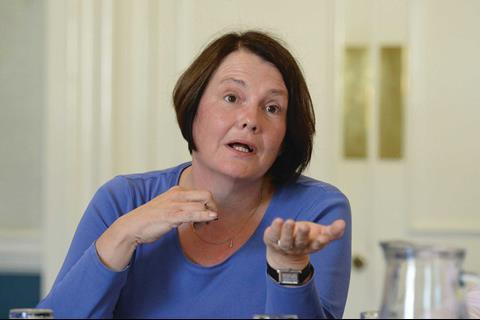The global financial crisis hit real estate legal services hard, blighting careers and forcing down fees. But the sector is bouncing back.
One story more than any other encapsulates the crisis that engulfed the commercial property sector during the darkest days of the recession. The Land Registry, it is claimed anecdotally, found itself overwhelmed by much-delayed applications to register properties. Why the delays? The explanation, it became clear, was that hundreds of commercial property lawyers, all with time on their hands, were rifling through their filing cabinets and unearthing transactions where they had ‘not got around to’ registering the property.
The recession hit commercial property lawyers particularly hard. Retailers ceased opening new outlets because their customer base had melted away. Logistics companies that supplied these wavering retailers were similarly loath to invest in new distribution centres. The construction of plush new offices ground to a halt. Hard-pressed local authorities could not afford to redevelop town centres.
And the National Health Service, squeezed for cash, put plans on hold to demolish Victorian hospital buildings and replace them with fit-for-purpose 21st century facilities. It was a dismal picture across the entire property sector, including residential.
As for commercial property lawyers themselves, many saw their careers wither. Some left the profession, others moved sideways into another area of the law (sometimes with dire consequences for an unsuspecting client), while others still tried moving in-house or into the public sector. A few were offered unpaid sabbatical leave by their firms, which is good work if you can afford it.
Those still working in the sector found that it had become a buyer’s market. Their clients, aware that their custom was desperately sought after, could pick and choose whom they instructed. They wanted more value-added services and lower billing fees, while others demanded ‘process excellence’. Firms brought in paralegals to force down costs and take on work previously done by qualified professionals.
The upshot in 2014 is that the pool of commercial property lawyers is much diminished. That was to be expected in a recession, of course, but how is the sector going to cope with resurgent demand? The latest Gazette roundtable, sponsored by capital allowances recovery specialists Catax Solutions, brought commercial property solicitors and clients together to debate that very question.
The discussion opens with attendees discussing the ‘changing needs and demands of clients’. Suzanne Gill, a commercial property partner at London firm Wedlake Bell, ventures: ‘It’s quite clear that the pressure put on fees during the last recession has now been accepted by clients as a benchmark. We find that people are looking for more for less… Clients expect their law firms to make good use of technology and for savings to feed through into fees and response times.’
Christopher Digby-Bell, former managing partner of Taylor Garrett (now Taylor Wessing) and board member of real estate investment and fund management business Palmer Capital, says: ‘It is all about value for money. Most law firms are offering all sorts of different pricing models, depending upon what you [the client] want, how quickly you want it and how large the transaction is. Like everything, there are opportunities and threats.
‘The opportunity is that some big City firms do not want to do real estate, which leaves the market open to smaller competitors. Looking at the reverse side of the coin, what are the threats? Speaking as a client, the biggest problem I think you have is there are too many of you.’
Gill asks: ‘Is that an oversupply of lawyers or a lack of differentiation between firms?’
‘I find it impossible to differentiate between law firms,’ Digby-Bell replies. Catax Solutions finance director David Elliott asks: ‘What does “more” mean to the buyer of the service? Where does the value-add come from?’
Gill responds: ‘I think they want more tailored advice and more consistent quality of advice. Value-add is not measured in terms of golf days or dinners anymore. People won’t take time away from the office and don’t see it as a good use of their fees.’
National firm DWF real estate finance partner Iain Thomas observes that the economic downturn has changed the profile of lawyers working in the commercial property sector. ‘There is very noticeably a missing generation,’ he says. ‘If you had five-year-qualified lawyers on the other side seven or eight years ago, you’d have expected them to be confident because they had done 50 or 60 similar deals before.
‘Nowadays, if you’ve got someone on the other side with that level of qualification, their experience is much, much more limited. So I think there is a premium now payable for senior lawyers who have seen the uptick and the downtick [in the market]. Clients are not prepared to pay any more for it, though.’
Mohammed Zain Ajaz, general counsel at National Grid Property, gives notice that ‘process excellence’ is set to change how legal services are commissioned and delivered. ‘I have done a couple of tenders recently,’ he says, ‘and what stood out is not only the professional credentials of the lawyers and the relationship you have with them, but also how they are going to do the piece of work for you. Process excellence is the new thing, where law firms come in and say they will take on the project and do a RACI Matrix to determine the main stakeholders and the processes to be followed.’
RACI is the initial letters of responsible (for doing the task), accountable (in charge of the work), consulted (someone who will give feedback or advice when required) and informed (who needs to know what actions or decisions are taken).
Ajaz continues: ‘One of the trends that I’m seeing is optimised solutions, with business managers or process excellence managers getting involved. We have seen Lean and Six Sigma [processes developed originally for manufacturers to eliminate waste] applied to other service industries and I think that law is the next one, with specialists doing RACIs for law firms.’
Elliott asks: ‘Are you talking there about improving the efficiency of the processes? That’s not necessarily the effectiveness of the service, is it? That’s cost reduction as opposed to value-add at the top end.’
Ajaz responds: ‘It is not giving me a three-page piece of advice, because I haven’t got time to read it. A page and a half is all I can manage. Lean and Six Sigma is a big buzz [term] within our organisation. It defines the processes and governance that I have to adhere to. It’s the next big thing within our organisation from an engineering perspective and it is now floating its way into our services, too.’
Palmer Capital’s Digby-Bell concurs. ‘You’re absolutely right,’ he says. ‘I haven’t got the time or the inclination to read through a three-page explanation of why the four-bullet-point summary is the correct summary. The problem with law firms, having been there myself, is they have an arse to protect and a professional indemnity policy to worry about. So one way or another, there is always going to be a three-page document, whether you read it or not.’
James Knox, a partner at magic circle firm Linklaters for 10 years and now a partner at City firm Berwin Leighton Paisner, is asked to give his perspective on the evolving commercial property landscape.
At the table
Hilary Palmer, Grant Saw; Mohammed Zain Ajaz, National Grid Property; David Elliott, Catax; Christopher Digby-Bell, Palmer Capital; Gareth Williams, Countrywide plc; David Sinclair, Norton Rose Fulbright; Mark Tighe, Catax; Kirsty Wright, Law Society Gazette; Jonathan Rayner, Law Society Gazette; James Knox, Berwin Leighton Paisner; Eduardo Reyes, Law Society Gazette; Suzanne Gill, Wedlake Bell; Iain Thomas, DWF
‘The global financial crisis and recession have created a huge upheaval in real estate legal services,’ he notes. ‘Some firms have moved out because real estate doesn’t meet the level of profitability that magic circle firms require. Other firms have not invested in real estate and people have left, scattered to the four winds. Some of these people have gone to start-ups, which in turn has caused pricing pressures, where the new firm is not good at business development and client relationship management and so just low-balls [deliberately underestimates] fees.’
He notes there is a ‘lost generation of lawyers’, adding: ‘There will come a time when we all try to recruit the elusive four-year qualifieds and they just won’t exist or will exist in relatively small numbers. Either that or [some] firms… will train them up in great numbers only to have people offer to pay them great money to lure them away.’
He is asked whether firms are being ‘short-sighted’ in letting their property teams shrink. ‘No, they are doing nothing different to what the gurus are telling us all,’ Knox replies. ‘Concentrate on what you’re good at, we are told. If you’re good at M&A and global finance, then you don’t need an IP or large real estate practice.’
Digby-Bell agrees: ‘Most M&A lawyers, if they are really top performers , won’t get out of bed on a major transaction for less than £650 to £700 an hour. Even the most expensive real estate partner isn’t going to cost you more than £450. So, if you’re managing that business in an upswing in the economy, where are you going to invest? You are going to invest in the guys who are able to charge £650 to £700 an hour, not the guys who are charging £450. It’s pretty simple economics.’
Gareth Williams, group company secretary of estate agency and property services company Countrywide, says: ‘From our perspective, magic circle firms do the big deals, with the property function being part of the due diligence element of the transaction. For the operational life [of the deal], we’d definitely go to a tier below magic circle. But actually, we are all talking about this huge choice in the market and yet there are some “go to” firms and they’re the same firms that come up all the time. I’m not sure there is a huge amount of choice.’
Catax Solutions managing director Mark Tighe steers the debate back to changing client expectations. ‘Proactive has been the key word for many years,’ he says. ‘Do your clients expect you to be proactive and, if so, what does it mean to you?’
Digby-Bell replies that it is advice that says ‘here is what you need today, but you need to think about this, this and this before going ahead’. He adds: ‘Bog-standard advice is just “here’s a job, I’ll do it, send you the bill” and that’s it.’
Are private practice lawyers on the panel brought in early enough to manage and influence the process? Hilary Palmer, a solicitor at London firm Grant Saw, is emphatic that they are not. ‘I like to be involved when the clients are negotiating the framework of the deal, not when they have already decided the heads of terms [agreed principles that precede the signing of a negotiated contract],’ she says. ‘Instead, you look and you think: “Oh, … they’ve done that or conceded this!” So, yes, the earlier you’re involved the better – except that you are [never] involved early enough.’
David Sinclair, a partner at international firm Norton Rose Fulbright, suggests a way to persuade clients to involve the lawyer earlier. ‘My experience is that the way to do it is to have a good relationship with the agents, because agents are often involved in structuring the deal right at the beginning,’ he says. ‘If the agents have your trust and confidence, and they know you’re not just there to create obstacles, but actually to facilitate or avoid obstacles down the line, they may involve you earlier on and, indeed, encourage the client to involve you earlier.’
Elliott and Tighe reference capital allowances and how in most transactions the new owners lose the tax relief to which they are entitled. Tighe says that there are exceptions, citing a recent £15m deal that Catax was involved in which realised £2.1m in tax benefit for the client. He asks the lawyers present how they cope with the complexities of tax law, and in particular the April 2014 changes to capital allowances.
Elliott explains: ‘Unless the vendor actually brings the value into their tax computation, the new owner, the purchaser, can’t claim any tax relief and neither can any future owners on that property. So, in other words, there is a loss of taxation, or leakage of taxation, from the property ownership chain.’
‘I think from the property perspective, it’s no accident that the capital allowances questions come at the very end of the commercial property standard enquiries,’ Palmer replies.
‘Property lawyers mostly hate dealing with tax, but we get around it by telling clients to go and talk to their accountants or tax planners. Of all the transactions I’ve got on at the moment, only in one case was there initial contact from the tax people saying we want to be involved in this and to draft certain of the clauses. That’s just one case in the last six months. Landlord clients particularly aren’t aware of it and don’t routinely get their accountants involved. They view accountants as the people who prepare their annual returns, rather than the people who will save them more than they charge.’
Palmer’s experience is not universal though. As Gill relates: ‘I’ve got one client in particular who we got the capital allowances for, and it was a total windfall for him. Now, all his agents have to say in the heads of terms “buyer gets any capital allowances that there are going”, and he’s spreading the word.’
The debate moves on to market conditions and the ‘risks that attend what seems an upturn in the commercial property market’. Sinclair says: ‘I think James [Knox] has identified one of the main risks and that’s the skills gap left by the recession. First, because a number of senior people left the profession during that period and weren’t replaced; second, because firms didn’t take on newly qualified people, which means there is now a dearth of four-year- and five-year-qualified lawyers.
‘Even the ones that are around now tend to have more experience of buying and selling retail property than they do about the sort of things you’d expect them to have experience of – like income-sharing uses, development agreements and forward-funding arrangements.’
Thomas concurs. ‘Exactly,’ he says. ‘It’s a very competitive environment at the moment, with huge downward pressure on fees, so you do have to find a way to differentiate yourself. The DWF model is an interesting one and, I think, very much a reaction to the market. We’ve put together a team in London that is pretty much a relationship team, so it’s just partners on the real estate side, all of whom have good relationships with clients.
‘We have also put together teams around the country based at our 11 other UK offices that give us a lower cost base and let us be more competitive on price. It takes some of the pressure off us as the relationship team. And also, as there is a lost generation, we are finding that for the cost of a four- or five-year lawyer in London, you can get a very good partner in Leeds, Newcastle, Birmingham, Manchester or Liverpool who is happy to fill the role of senior assistant.
‘It’s a question of shaping the way you do the work differently. What goes out the door to the client is no different, it is just how you’ve got to that point while managing the cost base more efficiently.’ Thomas notes that documentation software that generates, for example, heads of terms that ‘click in’ to the process helps ensure there is ‘no leakage of time’.
The discussion turns to dispute resolution in the commercial property sector. Digby-Bell says there are ‘remarkably few disputes’ because there are only around 500 ‘movers and shakers, all sensible businessmen’, who regard ‘litigation as a complete waste of money and time’. Sinclair endorses Digby-Bell’s view that disputes are infrequent. ‘Word gets out,’ Sinclair says, ‘and the agents, when they have a deal to offer, don’t tend to offer it to troublemakers.’
However, Gill says that sometimes one has to compromise. ‘If you take, for example, a high street name in retail which is known for taking a very, very aggressive approach to service charges,’ she says, ‘it still goes into shopping centres because it has to be there – it is a fantastic asset to have on the high street. All the landlords and retail agents will say that it is nothing but trouble, but we’ve just got to let it in.’
Are there reasons to feel optimistic about the state of the market? There was general agreement that international investment in property in London seems set to continue, despite competition from, in Digby-Bell’s words, ‘one or two stock markets around the world that are booming’. Knox concedes that there will always be competition from stock markets, but insists: ‘In some parts of the world, real estate investment is in the DNA. People’s view is “safe is something I can point at”, a building, rather than something [like shares or bonds].’
Digby-Bell continues: ‘I was talking to an American investor, and he was hugely impressed by the quality of legal advice offered in this country. He said that it was extremely difficult even in the US to get the same sort of quality advice. We don’t very often pat ourselves on the back,
but it would seem that we are a good way ahead of most, if not all other, countries in the world.’
And so a lively discussion ends on a point of consensus.
Jonathan Rayner is Gazette staff writer
- This roundtable was kindly sponsored by Catax Solutions



































No comments yet